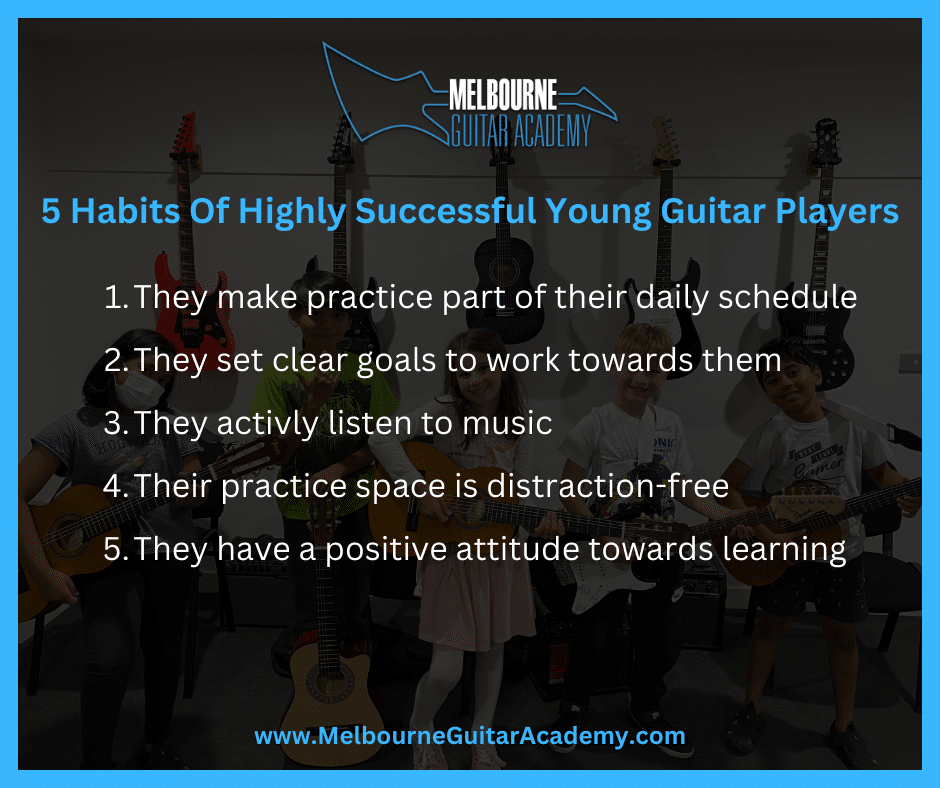Learn The Key Factors That Differentiate Great Players from Average Ones When It Comes To Kid’s Guitar Lessons
For parents with kids taking children’s guitar lessons, the road to success can often be filled with both challenges and rewards.
While some students seem to naturally excel in their guitar lessons, others may struggle to keep up or lose interest in their instrument altogether.
As a parent, it can be difficult to know how to support your child’s musical journey and help them achieve their full potential as a young musician.
But what separates successful young music students from those who struggle or fail? Is it innate talent, dedicated practice, or something else entirely?
In this article, we’ll explore the 15 key factors that contribute to the success of young music students and offer practical advice and tips for parents looking to help their children succeed in their guitar studies.
Please note: When I started writing this article my intention was to include 15 traits and behaviours of successful students. After writing the first draft it became apparent that it was too long an article and thus we have broken the article up into three parts.
You can find links to parts 2 & 3 at the bottom of this article

5 Traits Shared By Kids Who Successful Learn How To Play Guitar
I’ve taught over 1000 individual people to play the guitar in my 15 years as a professional guitar teacher.
Hundreds of these guitar students were kids and teenagers.
Some didn’t want to be there and quit after a few months. Most enjoyed their lessons and stuck with it for several years, but the ones that went the furthest and achieved high levels of proficiency or became professional musicians & music teachers themselves all shared similar traits.
I’ve also taught a few child prodigies who were better guitar players by the age of 12 or 15 than I was at age 25.
These young virtuosos all exhibited the same traits as the long-term successful players.
Some refer to it as natural talent, but I just noticed they developed better habits earlier on or had them from day 1.
So let’s take a look at the first five of these traits.
They Practice Their Guitar Regularly
Successful young musicians typically practice consistently and diligently.
This doesn’t mean they practice for hours and hours every day. In fact, most successful young learners only practice for 10-30 minutes at a time.
But they do it every day, and rarely miss a session.
These young learners are set up for success by parents who supervise their practice in the early stages and sit with them until it becomes a habit.
Then once a habit is formed we can increase the duration of their practice sessions over time.
If you want your child to be successful the #1 thing you can do is make practice part of their daily routine.
They Set Clear Guitar Playing Goals
The worst way to practice guitar is to pick up the instrument and try to decide what to work on.
It’s important to realise that most kids have no idea what they are meant to be doing and are reliant on having a good teacher (or their parents at home) to tell them what to do.
A great teacher will help establish some goals and break them down into smaller milestones. Hopefully, they will write out a practice plan and communicate what needs to happen between lessons in order for the student to progress.
As a parent, it’s your job to help your child work towards these goals until they are mature enough to be proactive in planning their own practice. This might not happen until their teen years.

They Actively Listen To Guitar Music
There is a common myth that you need to have an ear for music.
What I’ve noticed from 15 years of teaching guitar is the kids who are “naturally talented” at learning to play guitar spend a lot more time listening to music actively.
By definition, Active listening refers to listening to music consciously (rather than as a background task) and reflecting upon what is being heard.
Playing music for your kids and asking them questions like “what instruments do you hear?”, “How many beats could you count?” and “How did that music make you feel?” are great ways to help your child listen actively and reflect upon what they hear.
They Are Able To Focus Their Attention When Practicing Guitar
Most children rush through their practice as fast as possible so that they can jump on the PlayStation or go outside and kick the football.
For some parents even getting them out of the house and in the car on the way to their children’s guitar lessons is a battle.
The students who become great at their instrument are focused during their practice sessions and are able to pay attention to improving what they are working on.
Rather than just running through the motions while their mind is on Fortnite, they are conscious of what their fingers are doing and try to improve what they are doing with each rep.
If you can help your child focus and learn how to practice effectively they will be able to get more results in 10 minutes of focused practice than what most other kids get from an entire hour
They Love Playing Guitar And Have A Positive Attitude To Learning
Every single child prodigy I’ve ever taught had one thing in common: They loved playing guitar!
They had times when they practised, but they also had times when they just picked up the guitar and had fun with it.
They also took it upon themselves to listen to music, watch youtube videos and read articles about the guitar because they were genuinely interested in learning more about guitar.
This is critical because these students became guitar players through their actions and did what guitar players do.
If you can encourage your children to go beyond the lesson and fall in love with the process of learning and the hobby of guitar playing they will be a student for life!
Helping Your Kids Succeed In Their Guitar Lessons
Every child has the potential to become a truly great guitar player and succeed in learning to play guitar, and if they are enrolled in a children’s guitar lesson program for long enough, they will eventually develop the skills needed to play guitar well.
So why do some kids drop off after a few months without ever learning a full song and other kids grow up to be absolute finger wizards who can play Hendrix songs before the age of 12?
The answer lies in their habits and behaviours!
Every child I taught who became a great guitar all practised daily, set goals and worked towards them, actively listened to music, was able to stay focused during practice time and fell in love with the process of learning guitar so that it wasn’t a chore but part of who they were.
If you want your child to be successful in their endeavour of learning how to play guitar then you need to help them develop the traits that will make them successful.
There is no shortcut, just time spend building habits that are conducive to long-term success.
If you enjoyed reading this article then continue reading in part 2 we’ll present another 5 habits that are shared by successful guitar learning.
In part 3 we’ll present 5 traits shared by parents of successful guitar students that you can adopt into your own behaviour.
About The Author – Expert Children’s Guitar Teacher Michael Gumley
Michael Gumley is an expert guitar teacher from Melbourne, Australia who specialises in teaching children.
Not only does he have over 15 years of experience teaching children to play the guitar he has also written 12 books on guitar including three books specifically for kids and young learners.
He’s also developed a reputation for training young virtuoso guitarists with many of his students achieving a very high technical proficiency on the guitar.
If you’re looking for children’s guitar lessons near me reach out to Michael via his website and book a free trial lesson today.


